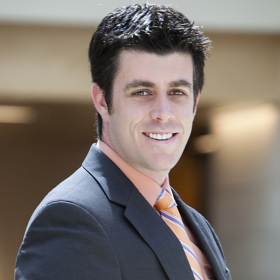
Even in an online setting, Dr. Steven Gray has experienced lively debate, insightful questions, and endless curiosity in his classes. As a new MAN 336H professor whose research is rooted in analyzing relationships within new venture teams, Dr. Gray seeks to use the already-founded relationships within Canfield BHP students to enrich the (virtual) learning experience.
Dr. Gray is in his fourth year as a professor within McCombs, but this is his first year teaching Canfield BHP students. Prior to UT, he earned his B.A. in Psychology from Yale, Master’s in Organizational Psychology from Columbia, and Ph.D. in Organizational Behavior from Washington University. In between degrees, Dr. Gray worked at IMB as a consultant, advising Fortune 100 pharmaceutical and telecommunications clients. He was drawn to McCombs and Austin because of the unique nature of the city, research opportunities, and students.
“(In my research) I study startup teams, so being in an ecosystem as vibrant as Austin is a big draw for me and a unique chance to go out and see entrepreneurs and hear their stories and learn about what they’re doing. That was kind of what initially drew me here,” Dr. Gray said. “I study how new venture teams come together. What are the traps that founders fall into as they’re trying to assemble their team and then what can they do to make that better? I try to incorporate teams into my teaching– teams in general, not just the formation process. I do take the perspective of introducing team selection and team formation and to some of the classwork.”
Because of the nature of management and the various theoretical principles that need to be taught, Dr. Gray works to incorporate real-life, complicated scenarios into his class. Some of these scenarios are business cases, but some are as unique as the example of Ernest Shackleton, an Arctic Explorer who attempted to reach the South Pole alongside a team he put together.
“My class is very much focused on the application of something that’s relatively abstract– not all that complicated of an idea, but when you try to actually put it into practice it often gets pretty messy,” he said. “What I really like to do is contextualize these ideas so that (students) are not just memorizing concepts, but rather trying to take an idea and make use of it in a complicated situation.”
One thing Dr. Gray has enjoyed is the energetic nature of Canfield BHP students. Even in a virtual environment, his Zoom classroom is no stranger to animated discussion and honest debate between students.
“The most noticeable thing that stands out in teaching students in the honors program is just the vibrant, active discussion that flows forth readily, which is great. It requires me to rebalance the time allocation because we can get really rolling down a path, but it has been a fun adjustment because I love the active, vigorous debate,” he said. “My students are a lot of really smart, opinionated, strong-willed people who are not shy about confronting someone else’s thought on any matter in good taste. It’s a fantastic learning environment that invites a healthy dialogue.”
Because Canfield BHP students travel from class to class in a cohort, the relationships that develop over time support the very dialogue that Dr. Gray appreciates. In this way, the tight-knit nature of the program contributes to an improved learning experience.
“It really does matter that everybody knows each other already,” he said. “You can see that create a learning experience and environment that I think helps everybody.”
For students looking forward to Dr. Gray’s class, he invites them to come prepared to debate and discuss topics each class day. Given the case-based nature of the class, students will have the opportunity to use their backgrounds, experiences, and intuition throughout.
“The exciting thing about teaching (Organizational Business) is that there is no set objective or clear, concrete answer to anything,” he said. “Part of what we do in the class is work to not provide simple, clear solutions to every problem, but rather to help people see the complexity that’s there. The ability (of students) to debate, discuss and think critically about all the things that are at play in any particular situation is the engine of the learning.”
What’s more, Dr. Gray says that his class serves as an opportunity for students to hone their self-awareness and critical thinking beyond the classroom. As a student of Psychology himself. Dr. Gray applies his own host of experiences and knowledge to the development of his students.
“In this class, every person brings their own intuition about psychology. We’re all people and we’ve all interacted with people our whole lives. We have an intuition about people– how they think and act. That intuition isn’t always very refined or accurate, so it’s fun to poke holes in our own intuition and show that reality is messy and complicated. I want to teach students to appreciate that and handle that through this class,” he said.
